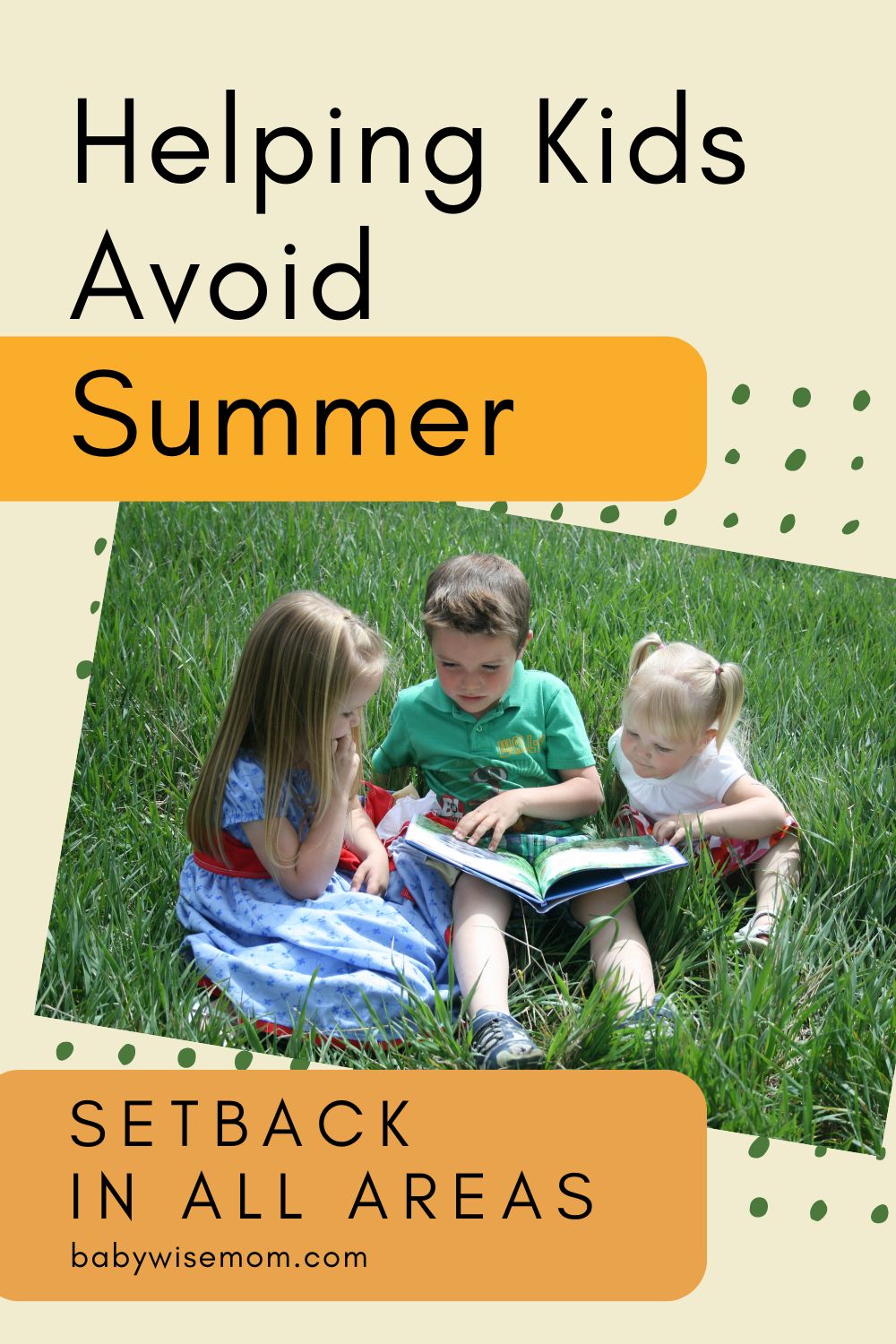How to avoid your child having the summer slide in all areas. Avoid summer setback in reading, writing, math, athletics and more.

The term “summer setback” is used to describe when the child either does not make progress academically, or more commonly, loses progress academically through the summer. When school starts back up, your child won’t necessarily be able to continue on from where he left off this school year.
Summer setback is a real thing. You can do things over the summer to help avoid this slide! As my children have gotten older, I have learned summer setback can apply to more than just reading skills, too. Other academic skills can slip, but so can skills like music skills, athletic skills, etc.
The reality of all skills is you are either moving forward or backward, and you have to be engaged with a skill to move forward.
Here are some ways to help your child avoid having summer setback this summer!
Post Contents
ACADEMIC SKILLS
Academic activities can be fun! For educational skills, have some learning time each day that can help keep those skills at work while still allowing for a break if you want a break. Summer setback is a real thing. Teachers all around will tell you to read, read, and read some more to help avoid summer setback. Our eBook Babes, Tots, and Kids covers all educational skills each week and can help you keep your child up to speed while still having fun.
Reading
Here are some ideas to help with reading skills:
- SSR: Something we do is Sustained Silent Reading (SSR) each day. This helps keep reading skills going on. This is when you all sit down and silently read together–including mom! It is a great activity to have a break for everyone each day and it also gives mom some downtime. Follow the link to learn more about this.
- Limit Easy Outs: You can also immensely help with reading skills if your child is a reader by limiting things like television and video games. When your child doesn’t have those things to turn to, they will often turn to reading. If they can’t do tech, reading can be an acceptable choice for how to spend time in their eyes. If tech is always available, there is a good chance they will take that option over reading.
- Have Summer Reading Goals: Join your local library’s summer reading program (see Summer Reading Programs). If your library doesn’t have one, create a reading program of your own for the neighborhood. Ask the reading specialist at your child’s school for ideas in helping your child through the summer–the one at our school will give us packets of information and activities geared toward the child’s level. Make a goal with your child to read so many minutes a day or so many books or pages for the summer with a prize at the end.
- Find Books of Interest: There are so many interesting books out there. Your child will be more likely to read if he has books he is interested in. There are tons of book lists floating around the internet. You can search Amazon for books and read reviews. You can poll social media for books your friends and family have loved. You can also find lots of book lists on this blog.
- Read Aloud to Your Child: I know that summer has late nights and crazy schedules. That can make reading aloud at bedtime difficult. Think ahead to make sure your child is read to each day by you. It is beneficial to read even to children who are avid readers themselves. Have a consistent time each day to read to your child. If bedtime is crazy, see if you can get it in another part of your day. If you know you will be out late, have some audio books to listen to in the car on the drive home. You can make it work if you want to.
- Visit the Library: Going to the library will help your child be more excited about choosing a book and reading it. We have a standing day each week when we go to the library. The kids love it!
- Have Your Child Read Aloud: It is also very good for your child to read out loud each day. It helps with fluency. Have older children read to younger children. Have children take turns reading at family scripture study. Get some readers for younger children to read to you each day. Have a time of day when your child reads to you. With my girls, I have often had them read a book to me while I do their hair.
See Preventing (or minimizing) Summer Setback for more on reading and summer setback.
Writing Skills
You also want to do some things to keep up the writing skills! I remember going back after summer break, even in college, and having my handwriting be a little rusty and my muscles in my hand sore as I got back in the groove of writing at school.
- Write Letters: Have your child write and mail letters the old fashioned way.
- Do Crafts: Doing crafts that involve scissors and other fine motor work will help keep those muscles ready for action. We have a lot of fine motor ideas in our eBook Babes, Tots, and Kids.
- Keep a Journal: Encourage your child to keep a journal this summer. If your child needs motivation, get a journal you and your child can write back and forth to each other in.
- Write Stories: Exercise the imagination and the hand by writing stories.
- Worksheets: There are a lot of writing worksheet exercises available online if you have a younger child who isn’t ready for journal writing or writing stories.
Other Skills
There are many other skills such as math (especially if your child learns timings–memorizing math facts), science, computers, and more. A little bit of searching online can help you find a lot of fun ideas. See my post Avoiding Summer Setback in Math for ideas for math.
MUSICAL SKILLS
The other day, a friend of mine who is a piano teacher commented that she doesn’t view piano as something you can take off for the summer. She said you should take it year round (though you do have breaks for various things). When I was growing up, I had summers off from my music lessons so I had never considered anything different. It makes sense; if you don’t keep up your piano work, you will at the least not progress (which I am sure is fine for some people and worth having the break). You might possibly regress and forget things. You will definitely lose finger strength if you don’t play.
Many teachers will teach through the summer. If yours doesn’t, or if you really want the summer off, try purchasing a piano book of fun songs that is at or just below your child’s level and have her learn a new song each week.
Our current teacher teaches throughout the summer. He often focuses on things that are more fun for the kids during summer. He might focus more on songwriting, for example.
ATHLETIC SKILLS
Your child might be involved in a sport that has the summer off. You might have the option to take the summer off or continue through the summer. There are some things to consider when deciding what to do.
One is to remember they are children, not professional athletes. If you and/or your child feel like they want/need time off, do it. You do not want them to burn out and hate the sport altogether. Burnout happens quite often. You want them to still have the chance to be kids.
Consider how big of a deal it will be to take a break. What will be lost? Skills? Strength? Endurance? Children make these things up quickly. You can do some backyard playing with your child at home to help with skills. They also can keep a lot of those things by doing other activities and staying active through the summer, which most children naturally do if given the opportunity.
When my children take a break, I always tell them that when they go back, they won’t be able to run as far or as fast (or whatever skill is pertinent to the situation) when they start back up as they did when they took the break. I tell them they will spend some time building that back up, but that with work they will get there.
Your child might just love the sport to death and not want to take a break. This is how McKenna was with gymnastics when she was little. She did not want to take a break from gymnastics during the summer. A whole lot of people took summer off and that is totally great.
You might just cut back rather than take a break. Brayden was on swim team. Our swim team did short course and long course, so that meant swim team was year round. They got a week off for spring break, they get two weeks off in the summer, and they get a few holidays off here and there, and that is it. For summer, Brayden would cut back on how often he goes to swim team rather than take it off altogether.
Summer is also a great time to try a different sport out. Participating in multiple sports is good for kids’ bodies and can help with injury prevention.
Conclusion
You can do a lot to prevent a major slide in skills with just a little bit of intentional activity in your day. You will not regret it once school starts back up!
Related Posts
- Avoiding Summer Setback
- How to Balance Academics with Relaxation in the Summer
- How to Balance Summer Fun and Routine for Kids
- A Chore Schedule Will Save Your Sanity This Summer

This post originally appeared on this blog in May 2015


